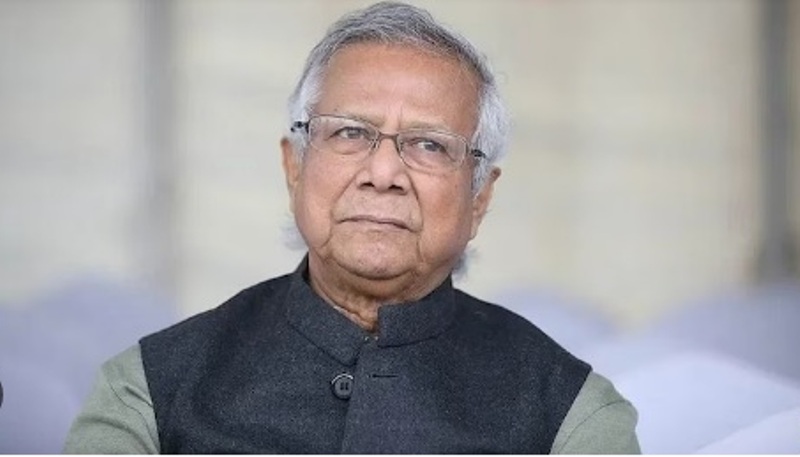When bulldozers are weaponised against minorities in one country, they serve the same purpose when used against minorities in another country. So, when a Bangladesh Railways earth mover was deployed in Dhaka’s Khilkhet area, on an overcast June 26 morning, to raze a makeshift Hindu temple, the state became complicit in a wanton act. India’s Uttar Pradesh may have served as a copybook for Bangladesh’s political mainstream.
The state, of course, was prompted into demolishing the temple by a mob – no prizes for guessing which religious denomination they owed allegiance to – which various arms of the state have been wary to act against. Targeted attacks against Bangladesh’s 8 percent minorities – Hindus and Buddhists – began ever since the Mohammad Yunus-led interim regime grabbed power in August 2024. These attacks then took on a sickening regularity.
Led by a vacillating chief, the Army preferred to not act – even turning away from preventing the destruction of Bangladesh’s founder Sheikh Mujibur Rahman’s house in Dhanmondi – each time mobs either descended on minority homes or places of worship or killed, maimed or raped Hindu men and women. The Army took on magisterial powers to supposedly root out crimes, mob violence and a general disregard for the law, but it has so far turned out to be a paper tiger.
The police, of course, is toothless while it is supposed to be the guardian of law and order.
Since the flight of Sheikh Hasina, several of her ministers, MPs and Awami League cadres, the Bangladesh Nationalist Party (BNP) found itself to be the largest political formation in Bangladesh. While it lost no time taking to gratuitous loot and plunder in Dhaka, the districts and villages, the BNP leadership in Bangladesh paid little attention to restraining its cadres. In phone conversations with some BNP leaders, including some figurehead Hindus, the stock response is one of whataboutery: in the last 16 years, the Awami League did this and did that and Muslims in India and also persecuted.
The BNP does not care, for it knows its electoral fortunes are not dependent on the minority vote. Ditto for the Jamaat-e-Islami whose registration as a political party was recently restored by a questionable judicial fiat. There are other openly communal outfits like the AB Party which is known for its vituperative diatribes against Bangladesh’s minorities. The National Citizens Party, of which Yunus is the chief patron, is in disarray but its young leadership knows that remaining silent on a powerful communal issue might help in political-electoral mobilisation.
Dhaka-based Hindu community elders confided that they have had at least two meetings with Mohammad Yunus over attacks on minorities. They have had separate meetings with some other advisers, including the Home Ministry adviser Lieutenant General (retd) Jahangir Alam Chowdhury, whose Home Secretary was a certified Hizbut Tahrir activist as a university student.
A few days ago, graphic images of a Muslim, with all the religious accoutrements, took social media by storm. He was seen poised to strike a blow against an elderly Hindu (by caste a barber) for alleged blasphemy against Islam. Nothing of the sort occurred. Inquiries revealed that the violence against the Hindu man and his son was a consequence of his rightful demand for money for services rendered. The perpetrator remains free.
Mob violence in Bangladesh was recently explained away as acts by “pressure groups” by Yunus’ press secretary who is known more in Dhaka’s journalistic circles as a person who has better ingratiating and servile qualities than as a professional journalist.
Many in Bangladesh, and certainly those in power, dismiss the unrestrained violence against the country’s minorities as “aberrations”. But this trope has been continuing far too long to be overlooked as mere occurrences. A few months ago, when Hindu baiting and persecution assumed record proportions, those in power justified it on the ground that the victims were Awami League supporters and were, therefore, legitimate targets.
Bangladesh’s intense minority baiting – and bashing – is intrinsically linked to its people’s all-consuming toxic and virulent anti-India sentiments. For this too, Bangladeshis have a ready response – for 16 years the Indian establishment lent full support to a “fascist” regime and therefore it must now suffer the consequences. This anti-India stance is again explained away, apologetically, as against the government in power in Delhi. But the truth, as Mark Twain said famously, can be stranger than fiction. Anti-India sentiments is not fiction. It is a reality and it is as good as anti-Hindu which extends to Indians.
The ‘new’ Bangladesh’s anti-minority vision that Yunus and his minions espouse will prove very costly for the country in the medium to long-term. Yunus’ job in Bangladesh is limited – to follow the diktats of a foreign agency and delay elections as long as possible – but this prolonged anti-Hindu stance will have consequences. If not now, certainly later.















